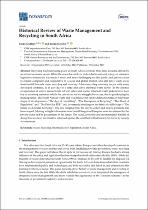JavaScript is disabled for your browser. Some features of this site may not work without it.
- ResearchSpace
- →
- Research Publications/Outputs
- →
- Journal Articles
- →
- View Item
| dc.contributor.author |
Godfrey, Linda K

|
|
| dc.contributor.author |
Oelofse, Suzanna HH

|
|
| dc.date.accessioned | 2017-11-06T08:00:59Z | |
| dc.date.available | 2017-11-06T08:00:59Z | |
| dc.date.issued | 2017-10 | |
| dc.identifier.citation | Godfrey, L.K. and Oelofse, S.H.H. 2017. Historical Review of Waste Management and Recycling in South Africa. Resources, vol.6(4):57 | en_US |
| dc.identifier.uri | http://www.mdpi.com/2079-9276/6/4/57/htm | |
| dc.identifier.uri | http://hdl.handle.net/10204/9717 | |
| dc.description | Open access article published in Resources, vol 6(4): 57 | en_US |
| dc.description.abstract | Recycling has been taking place in South Africa for more than three decades, driven by social and economic needs. While the waste hierarchy is embedded in national policy, an extensive legislative framework has made it more and more challenging for the public and private sector to remain compliant and competitive in a local and global market, and still drive waste away from landfill towards reuse, recycling and recovery. A local recycling economy, on par with many developed countries, is in part due to a large and active informal waste sector. In the absence of separation at source across South African cities and towns, informal waste pickers have been key to accessing resources which the private sector has struggled to access, due to gatekeeping by municipalities. The South African waste and recycling sector can be defined in terms of four main stages of development—“The Age of Landfilling”, “The Emergence of Recycling”, “The Flood of Regulation” and “The Drive for EPR”, and is currently standing on the brink of a fifth stage—“The future is a Circular Economy”. The low hanging fruit, the easy to collect and recycle products, has been reaped. Moving to higher diversion from landfill targets will require more investment by the private sector and by government in the future. The social, economic and environmental benefits of doing this are clear, but must be balanced against the cost that will ultimately be borne by society, as consumers. | en_US |
| dc.language.iso | en | en_US |
| dc.publisher | Resources | en_US |
| dc.relation.ispartofseries | Worklist;19704 | |
| dc.subject | Informal sector | en_US |
| dc.subject | Legislation | en_US |
| dc.subject | Recycling | en_US |
| dc.subject | South Africa | en_US |
| dc.subject | Waste | en_US |
| dc.title | Historical review of waste management and recycling in South Africa | en_US |
| dc.type | Article | en_US |
| dc.identifier.apacitation | Godfrey, L. K., & Oelofse, S. H. (2017). Historical review of waste management and recycling in South Africa. http://hdl.handle.net/10204/9717 | en_ZA |
| dc.identifier.chicagocitation | Godfrey, Linda K, and Suzanna HH Oelofse "Historical review of waste management and recycling in South Africa." (2017) http://hdl.handle.net/10204/9717 | en_ZA |
| dc.identifier.vancouvercitation | Godfrey LK, Oelofse SH. Historical review of waste management and recycling in South Africa. 2017; http://hdl.handle.net/10204/9717. | en_ZA |
| dc.identifier.ris | TY - Article AU - Godfrey, Linda K AU - Oelofse, Suzanna HH AB - Recycling has been taking place in South Africa for more than three decades, driven by social and economic needs. While the waste hierarchy is embedded in national policy, an extensive legislative framework has made it more and more challenging for the public and private sector to remain compliant and competitive in a local and global market, and still drive waste away from landfill towards reuse, recycling and recovery. A local recycling economy, on par with many developed countries, is in part due to a large and active informal waste sector. In the absence of separation at source across South African cities and towns, informal waste pickers have been key to accessing resources which the private sector has struggled to access, due to gatekeeping by municipalities. The South African waste and recycling sector can be defined in terms of four main stages of development—“The Age of Landfilling”, “The Emergence of Recycling”, “The Flood of Regulation” and “The Drive for EPR”, and is currently standing on the brink of a fifth stage—“The future is a Circular Economy”. The low hanging fruit, the easy to collect and recycle products, has been reaped. Moving to higher diversion from landfill targets will require more investment by the private sector and by government in the future. The social, economic and environmental benefits of doing this are clear, but must be balanced against the cost that will ultimately be borne by society, as consumers. DA - 2017-10 DB - ResearchSpace DP - CSIR KW - Informal sector KW - Legislation KW - Recycling KW - South Africa KW - Waste LK - https://researchspace.csir.co.za PY - 2017 T1 - Historical review of waste management and recycling in South Africa TI - Historical review of waste management and recycling in South Africa UR - http://hdl.handle.net/10204/9717 ER - | en_ZA |






